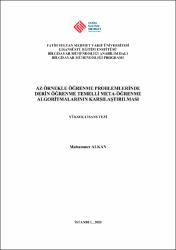| dc.contributor.advisor | Gülcü, Ayla | |
| dc.contributor.author | Alkan, Muhammet | |
| dc.date.accessioned | 2020-08-28T10:34:42Z | |
| dc.date.available | 2020-08-28T10:34:42Z | |
| dc.date.issued | 2020 | en_US |
| dc.identifier.citation | ALKAN, Muhammet, Az Örnekle Öğrenme Problemlerinde Derin Öğrenme Temelli Meta-Öğrenme Algoritmalarının Karşılaştırılması, Fatih Sultan Mehmet Vakıf Üniversitesi Lisansüstü Eğitim Enstitüsü Bilgisayar Mühendisliği Anabilim Dalı, Yayımlanmamış Yüksek Lisans Tezi, İstanbul 2020. | en_US |
| dc.identifier.uri | https://hdl.handle.net/11352/3142 | |
| dc.description.abstract | Meta-öğrenme, literatürde daha çok öğrenmeyi öğrenme olarak dikkat
çekmektedir ve bunun temel sebebi ise makine öğrenmesi yaklaşımlarının eğitim
sürecini daha önceki eğitimlerden elde edilmiş olan genel özellikleri kullanarak
kısaltmayı amaçlamasıdır. İnsanlardan örnek vermek gerekirse, yeni bir konuyu
öğrenirken daha önceki benzer konularla ilişki kurarak önceden elde etmiş oldukları
bilgiyle birlikte yeni konuyu öğrenme sürecini az sayıda örneğe bakarak başarılı bir
şekilde tamamlarlar. Aynı şekilde, makine öğrenmesi algoritmalarının her defasında
büyük bir veri kümesine ihtiyaç duymaksızın, az sayıda örnekle ve önceki
algoritmalardan öğrenilmiş olan meta-bilgilerle yeni görevler için daha hızlı bir
şekilde genelleştirilebilmesi meta-öğrenme sayesinde mümkündür.
Meta-öğrenme algoritmaları iki ana işlem içermektedir ve bu işlemler için iç
içe iki döngüye sahiptir. Dışarıdaki döngüde görevler hakkında genel özellikler
öğrenilmeye ve genel bilgiler çıkarılmaya çalışılırken, içerideki döngüde ise yeni
gelecek olan görevlere daha çabuk adapte olmaya çalışılır. Dışarıdaki döngüde
çıkartılan genel özellikler sayesinde, içerideki adaptasyon sürecinin daha kısa ve
daha doğru sonuçlar elde etmesi sağlanır.
MAML ve ProtoNet gibi, literatürde karşılaştırma için çokça kullanılmakta
olan meta-öğrenme algoritmalarının, az örnekle öğrenme problemlerine uygulanarak
Omniglot, MiniImageNet, CIFAR100 ve CUB gibi birden fazla veri kümesi üzerinde
elde edecekleri sonuçlar ayrıntılı incelendi. Bu sonuçlara bakarak meta-öğrenme hakkında, kullanılan algoritmalar (MAML ve ProtoNet) ve veri kümeleri (Omniglot,
MiniImageNet, CIFAR100 ve CUB) hakkında çıkarımlar yapıldı.
MAML algoritması için; eğitim ve test sürecindeki adım sayıları, adım
genişliği gibi parametreler farklı yol sayısı (way) ve örnek sayısı (shot)
yapılandırmaları üzerinde test edilmiştir. Örnek sayısı 1 olarak alındığında MAML
algoritması daha başarılı sonuçlar elde ederken örnek sayısı 5 olarak alındığında ise
MAML ve ProtoNet algoritmaları yaklaşık olarak benzer sonuçlar elde etmişlerdir. | en_US |
| dc.description.abstract | Meta-learning stands out as “learning to learn” in the literature, and aims to
shorten the training process of machine learning approaches by using the general
features obtained from previous training. For example, while people learn a new
subject, they successfully complete the process of learning the new subject with a
few examples by and establishing a relationship with the previous similar topics and
the knowledge they have previously obtained. Likewise, machine learning algorithms
can be quickly generalized for new tasks with a few training examples and
knowledge learned from previous training examples without the need for a large data
set each time.
Meta-learning algorithms involve two main processes and have two nested
loops for these processes. While trying to learn general features in the outer loop
about the tasks and to get general information, it is tried to adapt to the new tasks
more quickly in the inner loop. By this way, learned general features in the outer
loop makes the adaptation process inside shorter and ensures it gets more accurate
results.
Meta-learning algorithms, such as MAML and ProtoNet, which are widely
used in the literature are applied to few-shot learning problems and the obtained
results examined in detail on multiple data sets such as Omniglot, MiniImageNet,
CIFAR100 and CUB. Based on these results, inferences about meta-learning,algorithms (MAML, ProtoNet) and datasets (Omniglot, MiniImageNet, CIFAR100
and CUB) were made.
Parameters such as number of gradient steps and step size in the training and
testing were tested on different way and shot configurations for the MAML
algorithm. While MAML obtained more successful results when the number of shot
is taken as 1, MAML and ProtoNet algorithms obtained approximately similar results
when the number of shot was taken as 5. | en_US |
| dc.language.iso | tur | en_US |
| dc.publisher | Fatih Sultan Mehmet Vakıf Üniversitesi, Lisansüstü Eğitim Enstitüsü | en_US |
| dc.rights | info:eu-repo/semantics/openAccess | en_US |
| dc.subject | Meta-Öğrenme | en_US |
| dc.subject | Az Örnekle Sınıflandırma | en_US |
| dc.subject | Maml | en_US |
| dc.subject | ProtoNet | en_US |
| dc.subject | Meta-Learning | en_US |
| dc.subject | Few-Shot Classification | en_US |
| dc.subject | Maml | en_US |
| dc.subject | ProtoNet | en_US |
| dc.title | Az Örnekle Öğrenme Problemlerinde Derin Öğrenme Temelli Meta-Öğrenme Algoritmalarının Karşılaştırılması | en_US |
| dc.title.alternative | Comparison of Deep Learning Based Meta-Learning Algoritms on Few-Shot Learning problems | en_US |
| dc.type | masterThesis | en_US |
| dc.contributor.department | FSM Vakıf Üniversitesi, Lisansüstü Eğitim Enstitüsü | en_US |
| dc.relation.publicationcategory | Tez | en_US |
| dc.contributor.institutionauthor | Alkan, Muhammet | |



















